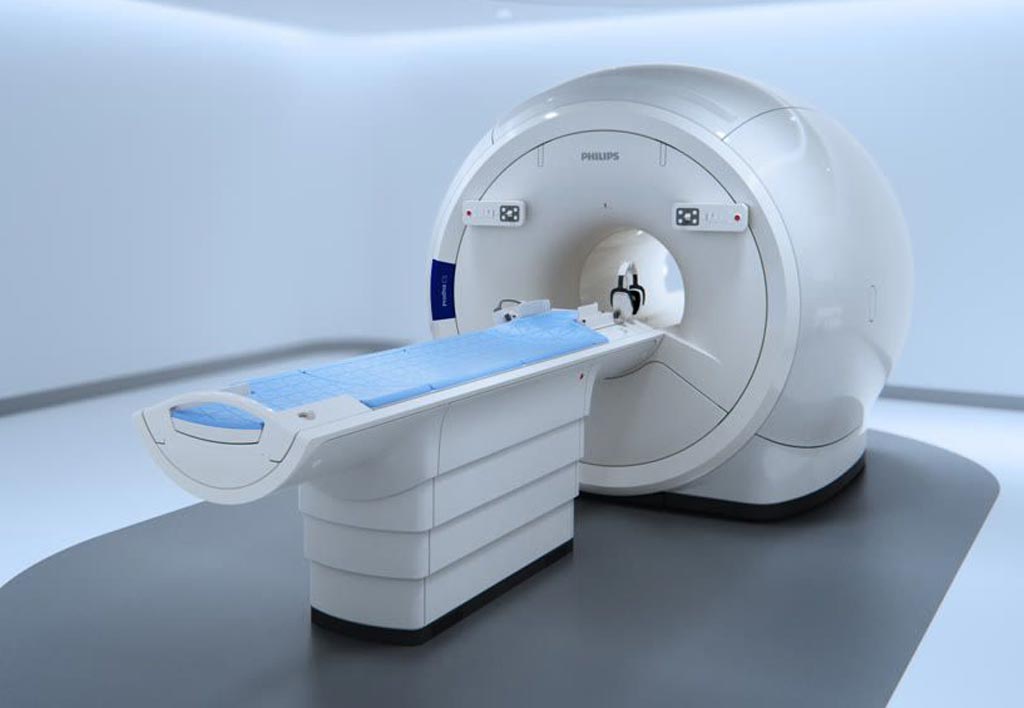Sealed Magnet Delivers Helium-Free MRI Scanning
By MedImaging International staff writers
Posted on 27 Sep 2018
A new magnetic resonance imaging (MRI) scanner includes a fully sealed magnet that enables helium-free operations, and other innovations that help system reduce downtime.Posted on 27 Sep 2018
The Royal Philips (Philips; Amsterdam, The Netherlands) Ingenia Ambition X 1.5T MRI with BlueSeal magnet technology permanently seals helium inside the device, reducing the total amount of helium needed to operate a conventional MRI system (1,500 liters) to less than 0.5% (a mere seven liters). As a result, the fully sealed system is around 900 kg lighter than its predecessor and does not require a vent pipe, significantly reducing siting challenges and construction costs resulting from the use of conventional magnets.

Image: The Ingenia Ambition X 1.5T MRI with BlueSeal magnet technology (Photo courtesy of Philips Healthcare).
The Ingenia Ambition X includes features that deliver a step-change in productivity. The EasySwitch solution allows the BlueSeal magnetic field to be easily turned off if an item is stuck in the bore; once resolved, an automated ramp-up sequence brings the magnet back to operation, minimizing downtime. Ingenia Ambition X also combines guided patient setup and Adaptive Intelligence (AI) driven SmartExam analytics for automatic planning, scanning, and processing, freeing up time to enable a single operator to manage the full scan from the patient's side with just a single touch of a button.
Other features include Philips Compressed SENSE, an advanced acceleration application that reduces exam times by up to 50%. In addition, Philips VitalEye adds a unique approach to detecting patient physiology and breathing movement, using algorithms to intelligently extract signs of breathing, thus allowing exam set-up time to take less than a minute, even for less experienced operators. Together, these innovations help to standardize and speed up clinical workflow, allowing clinicians to focus on the patient.
“MRI provides exceptional diagnostic and therapy guidance capabilities, but it also places substantial operational demands on the hospital or imaging center due to requirements for installation, footprint, and service,” said Arjen Radder, global business leader for MRI at Philips. “The fully-sealed magnet dramatically reduces the amount of liquid helium needed to cool the magnet. This results in significant operational benefits, including a smaller, lighter, and more flexible installation footprint, and a more efficient return to normal operations, if an interruption in service should ever occur.”
"We are very proud to be the first hospital in the world to offer this new cutting edge, resource-friendly MRI technology to our patients,” said Andreas Steinauer, MD, chief radiologist at Spital Uster Hospital (Switzerland). “With the new Philips Ingenia Ambition X our patients can have the best of two worlds: leading MRI technology with a smaller footprint. This new, leaner platform will allow more sites to deliver advanced MRI technology to their patients, helping to improve patient care.”
Liquid helium is used to keep superconducting magnets cool in an MRI machine. But although Helium is the second most abundant element in the universe (after hydrogen), decades of imprudent use have resulted in its depletion. The mandated sell-off of the U.S. national reserve prompted the U.S. Congress to pass the Helium Stewardship Act, designed to ease the pending global helium shortage. The recent discovery of one of the world’s biggest helium gas fields in the Tanzanian Rift Valley in Africa can also safeguard the future of MRI scanners.














